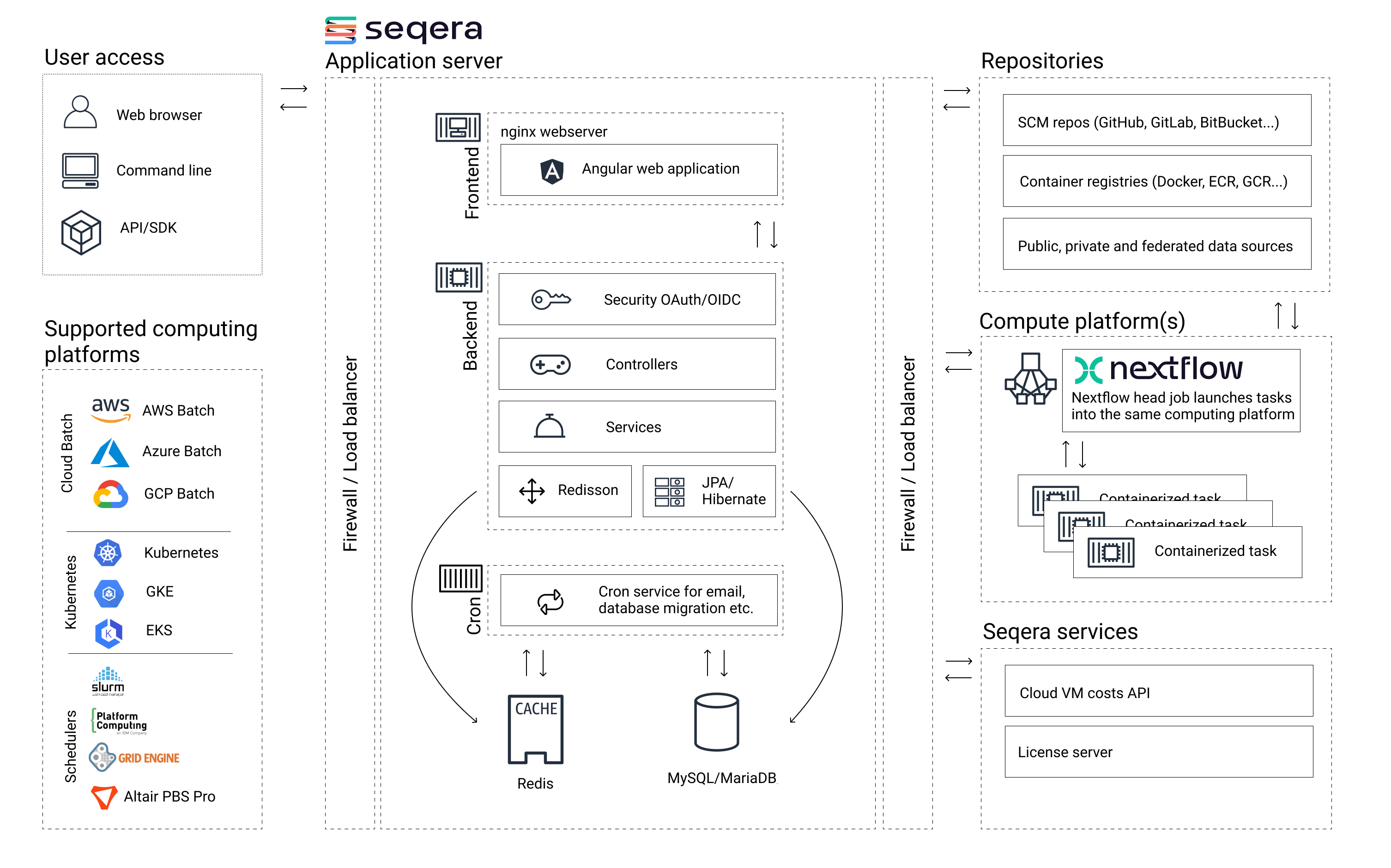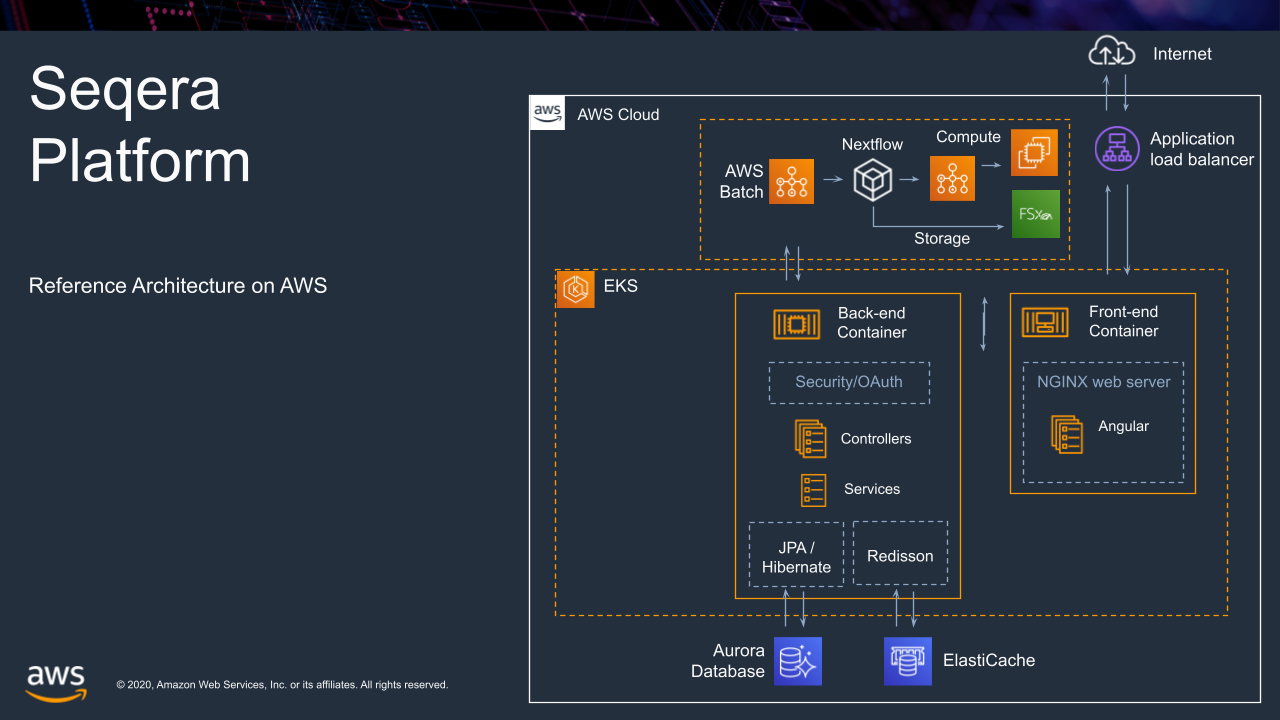Enterprise installation
Seqera Enterprise requires a license. If you have not already purchased a license, contact us for more information.
Seqera Platform Enterprise is a web application with a microservice-oriented architecture that is designed to maximize portability, scalability, and security. It's composed of several modules that are configured and deployed according to your organizational requirements. Seqera provides these modules as Docker container images that are securely hosted on a private container registry.
Architecture

Platform backend
The Seqera backend is a JVM-based web application based on the Micronaut framework, which provides a modern and secure backbone for the application.
The backend implements the main application logic, which is exposed via a REST API and defined with an OpenAPI schema. The backend uses JPA, Hibernate, and JDBC API industry standards to interact with the underlying relational database.
The backend can be run standalone or as multiple replicas for scalability when deployed in high-availability mode. It should run on port 8080.
Platform cron
Cron is an auxiliary backend service that executes regularly-occurring activities, such as sending email notifications and cleaning up stale data. The cron service also performs database migrations at startup.
Platform frontend
The Seqera frontend is an NGINX web server that serves the Angular application and reverse-proxies HTTP traffic to the backend.
The frontend should run on port 80 within the container and should be the only service that accepts incoming HTTP traffic. The frontend can also be exposed via HTTPS or a load balancer.
Redis database
Seqera Enterprise requires a Redis database for caching purposes.
SQL database
Seqera requires a SQL database to persist user activities and state. The application has been tested against MySQL 8.0. Contact Seqera support if you need to use a different JDBC-compliant SQL database.
SMTP service
Seqera requires an SMTP relay to send email messages and user notifications.
Authentication service (optional)
Seqera supports enterprise authentication mechanisms such as OAuth and OpenID. Third-party identity providers and custom single sign-on flows can be developed according to specific customer requirements.
Deployment options
Seqera can be deployed to a single node, either with Docker Compose or natively, or to a Kubernetes cluster. This documentation includes instructions for both options across multiple platforms, including Amazon AWS, Microsoft Azure, Google Cloud, and on-prem infrastructure.
Single-node
The minimal Seqera Enterprise deployment requires only the frontend, backend, and database services. These services can be deployed as Docker containers or as native services.
Kubernetes
Kubernetes is emerging as the technology of choice for deploying applications that require high-availability, scalability, and security. Seqera Enterprise includes configuration manifests for Kubernetes deployment.
 Reference architecture diagram of Seqera Platform Enterprise on AWS using Elastic Kubernetes Service (EKS)
Reference architecture diagram of Seqera Platform Enterprise on AWS using Elastic Kubernetes Service (EKS)
Application container images
Seqera Enterprise is distributed as a collection of Docker containers available through the Seqera
container registry cr.seqera.io. Contact support to get your container access credentials. When you've received your credentials, retrieve the application container images with these steps:
-
Retrieve the
nameandsecretvalues from the JSON file you received from Seqera support. -
Authenticate to the registry by using the
nameandsecretvalues copied in the previous step:docker login -u '<NAME>' -p '<SECRET>' cr.seqera.io -
Pull the application container images:
docker pull cr.seqera.io/private/nf-tower-enterprise/backend:v23.4.3
docker pull cr.seqera.io/private/nf-tower-enterprise/frontend:v23.4.3
The Seqera container registry cr.seqera.io is the default application container image registry from version 22.4. AWS, Azure, and Google Cloud image registries in existing installations are still supported, but are deprecated for new installations from June 2023.
Support
For further information, contact Seqera support.